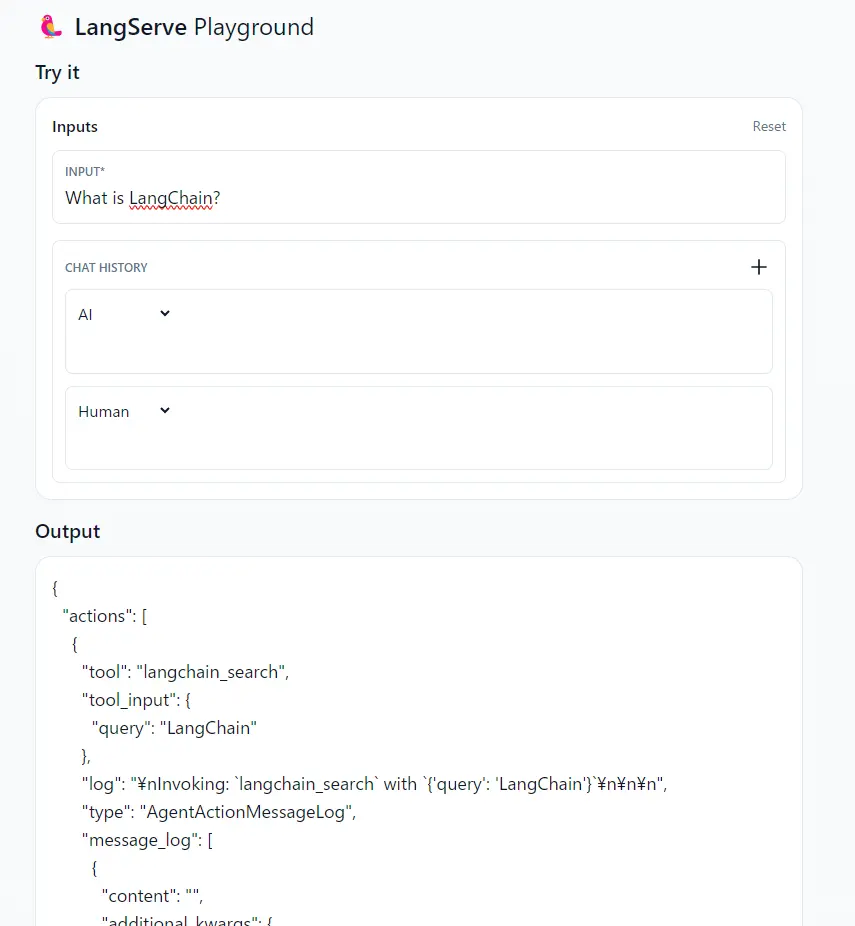Exploring LangChain's Quickstart (5) - Serve as a REST API (LangServe)

Series - Exploring LangChain's Quickstart
Contents
This series dives into how to use LangChain, based on the LangChain Quickstart guide.
In this post, we’ll explore how to deploy LangChain agents as a REST API using LangServe.
Recap of the Previous Post
In our last post, we created an agent that combines tools for answering LangChain-related queries with internet search capabilities.
Here’s a recap of the code we used:
import os
from langchain import hub
from langchain.agents import AgentExecutor, create_openai_functions_agent
from langchain.tools.retriever import create_retriever_tool
from langchain_community.document_loaders import WebBaseLoader
from langchain_community.tools.tavily_search import TavilySearchResults
from langchain_community.vectorstores import FAISS
from langchain_openai import ChatOpenAI, OpenAIEmbeddings
from langchain_text_splitters import RecursiveCharacterTextSplitter
# Set up the API key as environment variable
with open(".openai") as f:
os.environ["OPENAI_API_KEY"] = f.read().strip()
# Load web page content
loader = WebBaseLoader("https://python.langchain.com/docs/get_started/introduction")
docs = loader.load()
# Load embeddings
embeddings = OpenAIEmbeddings()
# Split the documents
text_splitter = RecursiveCharacterTextSplitter()
documents = text_splitter.split_documents(docs)
# Vectorize documents and create a vector store
vector = FAISS.from_documents(documents, embeddings)
# Create a retriever
retriever = vector.as_retriever()
# Search tool for document retrieval
retriever_tool = create_retriever_tool(
retriever,
"langchain_search",
"A search tool for LangChain-related queries. Use this for questions about LangChain!",
)
# Set Tavily API key
with open(".tavily") as f:
os.environ["TAVILY_API_KEY"] = f.read().strip()
# Internet search tool
search = TavilySearchResults()
# List of tools in use
tools = [retriever_tool, search]
# Get template from LangChain Hub
template = hub.pull("hwchase17/openai-functions-agent")
# Create an agent
llm = ChatOpenAI(model="gpt-3.5-turbo", temperature=0)
agent = create_openai_functions_agent(llm, tools, template)
agent_executor = AgentExecutor(agent=agent, tools=tools, verbose=True)9. Operating as a REST API (LangServe)
9.1. Installing LangServe
First, install LangServe with the following command:
pip install "langserve[all]"
9.2. Creating serve.py
Create a file named serve.py with the following content:
import os
from typing import List
from fastapi import FastAPI
from langchain import hub
from langchain.agents import AgentExecutor, create_openai_functions_agent
from langchain.pydantic_v1 import BaseModel, Field
from langchain.tools.retriever import create_retriever_tool
from langchain_community.document_loaders import WebBaseLoader
from langchain_community.tools.tavily_search import TavilySearchResults
from langchain_community.vectorstores import FAISS
from langchain_core.messages import BaseMessage
from langchain_openai import ChatOpenAI, OpenAIEmbeddings
from langchain_text_splitters import RecursiveCharacterTextSplitter
from langserve import add_routes
# Set up the API key as environment variable
with open(".openai") as f:
os.environ["OPENAI_API_KEY"] = f.read().strip()
# Load web page content
loader = WebBaseLoader("https://python.langchain.com/docs/get_started/introduction")
docs = loader.load()
# Load embeddings
embeddings = OpenAIEmbeddings()
# Split the documents
text_splitter = RecursiveCharacterTextSplitter()
documents = text_splitter.split_documents(docs)
# Vectorize documents and create a vector store
vector = FAISS.from_documents(documents, embeddings)
# Create a retriever
retriever = vector.as_retriever()
# Search tool for document retrieval
retriever_tool = create_retriever_tool(
retriever,
"langchain_search",
"A search tool for LangChain-related queries. Use this for questions about LangChain!",
)
# Set Tavily API key
with open(".tavily") as f:
os.environ["TAVILY_API_KEY"] = f.read().strip()
# Internet search tool
search = TavilySearchResults()
# List of tools in use
tools = [retriever_tool, search]
# Get template from LangChain Hub
template = hub.pull("hwchase17/openai-functions-agent")
# Create an agent
llm = ChatOpenAI(model="gpt-3.5-turbo", temperature=0)
agent = create_openai_functions_agent(llm, tools, template)
agent_executor = AgentExecutor(agent=agent, tools=tools, verbose=True)
# Create an app
app = FastAPI(
title="LangChain Server",
version="1.0",
description="A simple API server using LangChain's Runnable interfaces",
)
# Adding routes (OpenAI)
add_routes(
app,
llm,
path="/openai",
)
# Adding routes (Agent)
# (As the current AgentExecutor does not have defined schemas,
# you need to set up its input/output schemas.)
class Input(BaseModel):
input: str
chat_history: List[BaseMessage] = Field(
...,
extra={"widget": {"type": "chat", "input": "location"}},
)
class Output(BaseModel):
output: str
add_routes(
app,
agent_executor.with_types(input_type=Input, output_type=Output),
path="/agent",
)
if __name__ == "__main__":
import uvicorn
uvicorn.run(app, host="localhost", port=8000)
9.3. Running serve.py
Execute serve.py to launch the application that will serve your REST API:
python serve.py9.4. Using the REST API
-
To use the newly created REST API from Python:
from langserve import RemoteRunnable remote_chain = RemoteRunnable("http://localhost:8000/agent/") remote_chain.invoke({ "input": "What is LangChain?", "chat_history": [] })-
Output
{'output': 'LangChain is a framework for developing applications powered by large language models (LLMs). It simplifies every stage of the LLM application lifecycle, including development, productionization, and deployment. The framework consists of open-source libraries such as langchain-core, langchain-community, langchain, langgraph, and langserve. LangChain also includes LangSmith, a developer platform for debugging, testing, evaluating, and monitoring LLM applications. It offers various use cases, an Expression Language (LCEL), and a comprehensive ecosystem of tools and integrations.'}
-
-
To test the API from a web browser, navigate to http://localhost:8000/agent/playground/.
Here, you can interact with the API via the Playground:
